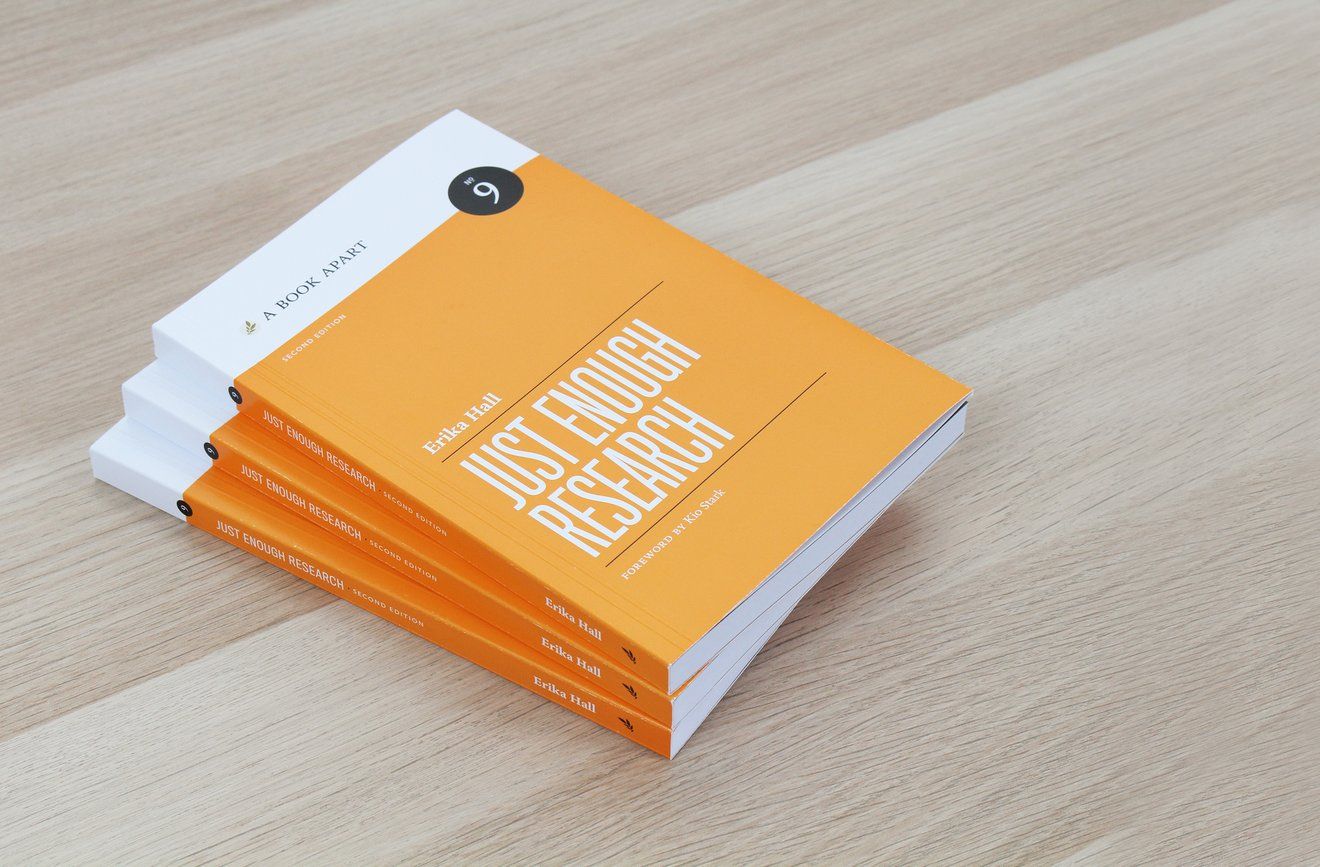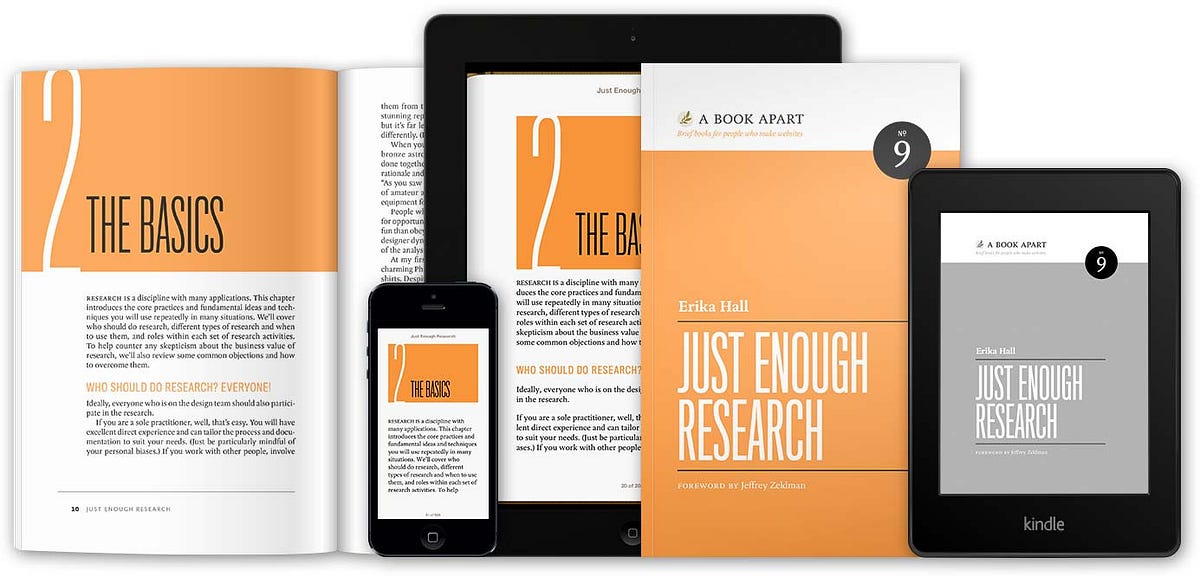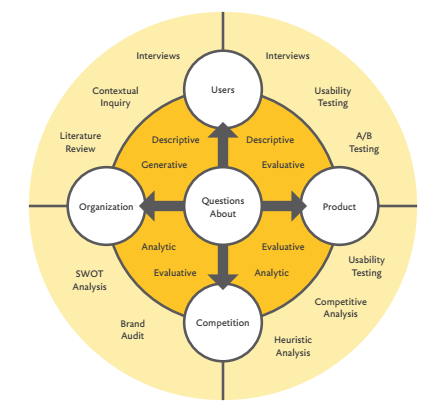Erika Hall
Erika Hall is the co-founder and Director of Strategy at Mule Design and the author of Just Enough Research. Her consulting practice focuses on helping organizations make better, more evidence-based decisions.

Just Enough Research
Erika Hall is the co-founder and Director of Strategy at Mule Design.
Her consulting practice focuses on helping organizations make better, more evidence-based decisions.
She is the author of Just Enough Research, now in its second edition, and Conversational Design, both from A Book Apart. Erika loves helping people overcome the often invisible organizational barriers to doing good work.
Presentations
Design With Words
The tools and practices that carried over from graphic design have worked well for us in software design since the advent of graphic user interfaces. However, that time may be coming to an end.
Beyond Measure
Even though everything is measurable, and almost everything we do is generating data, human problems often require illogical approaches. A good story is more powerful than a stack of facts.
Just Enough Research
At An Event Apart Orlando, Erika Hall presented her talk, Just Enough Research, makes the case for doing the research necessary to help the products, services, or interfaces we design in the safety and comfort of our workplaces to survive and thrive in the real world.
Asking Why (PopTech 2015)
Designers must also be philosophers, and asking “why?” is our most vital tool.
Chapter 8: Analysis and Models
Erika wrote the book, Just Enough Research, published by A Book Apart. She has a couple published articles in A List Apart.
In this sample chapter from her book, she refers to humans as social creatures and pattern-recognition machines.
Here is a quick overview of the book:

And a more in-depth summary:

Select the Approach
If your question is about users themselves, you’ll be doing user research, or ethnography. If you want to assess an existing or potential design solution, you’ll be doing some sort of evaluative research.

Research Methods
- Interviews
- Contextual Inquiry
- Literature Review
- Usability Testing
- A/B Testing
- SWOT Analysis
- Brand Audit
- Competitive Analysis
- Heuristic Analysis
Usability Testing
And for the record “user testing” isn’t really a thing because you aren’t testing users, you are testing the usability, or other qualities, of a system. Intentional phrasing matters.
— Erika Hall

Challenging Authority
Designers inhabit the tension between the organizational hierarchy and the creative, collaborative network that is the innovation engine of the organization. Invariably, the authoritarian nature of the typical hierarchy is something that designers must seek to challenge for the sake of well-being of the organization, or the organization risks losing the ability to innovate and will be destined to fail. Erika Hall offered this insight in a conversation with Jared Spool.
That’s what research is. Research is challenging given ideas, so it’s naturally anti-authoritarian. If you’re in an authoritarian business culture, you have to work very carefully to change that.
Understanding Behavior
That's actually one of the criticisms of research is that you're asking people what they want. People will speculate, and this is something you have to be really careful of when you do research about people and their actual behaviors and habits.
If you ask the question the wrong way, what you'll hear is what people are speculating about, which might have no connection to how they actually behave. We humans are terrible, terrible reporters of our own behavior.
That's one of the key research skills is getting through that. Through how people think of themselves, which is usually a little bit more optimistic than how they actually behave.
Collaborative Research
The nice part about working with research is doing this research together makes teams more collaborative. By being collaborative and doing the research, it makes the research more effective. It's this really virtuous cycle, but it doesn't happen on its own. It absolutely does not happen on its own.
Researchers, as humans, will do what's habitual and comfortable for them, which is want to be a specialist, and go off in a corner, and do a rigorous course of study, and write up a report. Then, designers and developers will do what they want to do, which is not read anything and go off and do things that are interesting and feel productive to them.
You have to recognize that changing these behaviors is not insurmountable, but it requires intentional effort on the part of everyone involved. Once you have that, then it's all great, and you get people working together.

Surveys: Misunderstood and Misused
Surveys are the most dangerous research tool — misunderstood and misused. They frequently straddle the qualitative and quantitative, and at their worst represent the worst of both.
Surveys are the most dangerous research tool. An excerpt from my talk about making decisions based on data.https://t.co/vKbAutSpYq#UI20
— Erika Hall (@mulegirl) November 3, 2015


“Not all surveys are bad surveys, but many are.”
“Good research starts with a good research question, one that is specific, actionable, and practical. This means you’re taking cues from what you want to learn, not what kind of research method you chose to use.”
Focus Groups
There is an interesting debate going on between UX research professionals about the value of focus groups.
Because of Erika Hall’s expertise in the area and her strong views about focus groups, they tend to be avoided as a UX research methodology. Erika argues that focus groups tend to be ineffective because of the effect of group dynamics on the opinions that are offered in a group setting.
Another consideration is the cost, in terms of time and money.

Emma Boulton describes some of the benefits and disadvantages of focus groups.

The greater risk is to design and build a product without doing research. So, the important thing is to decide how much research will be enough to make the right decisions.
Yet focus groups are not research; they’re research theater. They tell us very little about how real people behave in the real world. The brilliant sociologist and father of focus groups Robert K. Merton later lamented their misuse in replacing research: “Even when the subjects are well selected, focus groups are supposed to be merely the source of ideas that need to be researched.”

Empathy for People
UX design is all about understanding the experiences of people who are using a product, engaging in a service, or trying to accomplish a specific task. Research is the first step in gaining empathy for people.
Which brings us to another debate: should we dispense with the term “user”? Is it not dehumanizing? Rather than “user experience”, should we refer to “human experience”?

Attitudes change over time as people are exposed to new ideas. So, curiosity and conversation are essential tools in a designer’s toolkit.
The 9 Rules of Design Research
- Get comfortable being uncomfortable
- Ask first, prototype later
- Know your goal
- Agree on the big questions
- There is always enough time and money
- Don’t expect data to change minds
- Embrace messy imperfection
- Commit to collaboration
- Find your bias buddies
What I like about Erika Hall’s “Just Enough Research” is that it focuses on the real world scenario of a team that has limited time, a limited budget, and limited resources.
If it helps with your analysis, here is a list from pages 53 and 54 of Erika Hall’s Just Enough Research. This list is also cited in her presentation on Collaborative Research.
What is the data?
You are looking for quotes and observations that indicate:
- Goals (what the participant wants to accomplish that your product or service is intended to help them with or otherwise relates to).
- Priorities (what is most important to the participant).
- Tasks (actions the participant takes to meet their goal).
- Motivators (the situation or event that starts the participant down the task path).
- Barriers (the person, situation, or thing that prevents the participant from doing the task or accomplishing the goal).
- Habits (things the participant does on a regular basis).
- Relationships (the people the participant interacts with when doing the tasks).
- Tools (the objects the participant interacts with while fulfilling the goals).
- Environment (what else is present or going on that affects the participant’s desire or ability to do the tasks that help them meet their goals).
Research Insights
A couple Designlab students, Ashley Des Marais and Renee Bruhn, have been working together on a collaborative Phase 2 capstone project.
They used Erika Hall’s list to help define the categories for their affinity map.
You can see how they used the insights they gained from this analysis of their interview results to formulate some conclusions on page 6 of their research findings.

